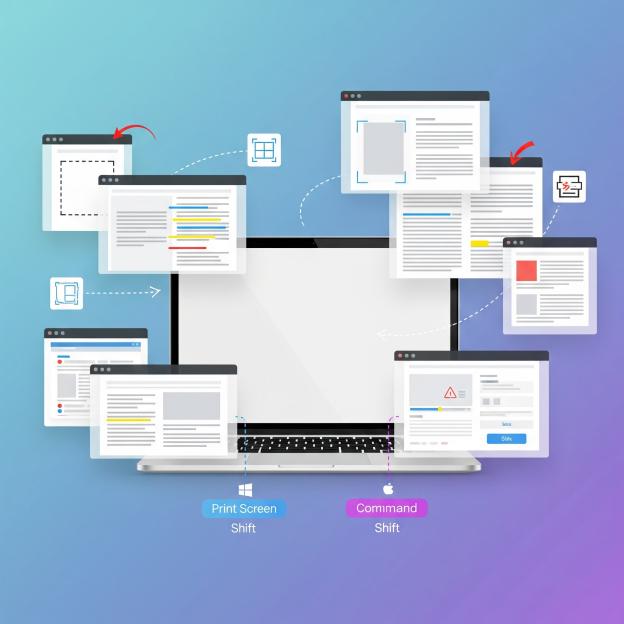Finding the right laptop for college? It’s a total game-changer for your academic experience.
With tech evolving at lightning speed and so many options dropping every season, it’s lowkey overwhelming to find something that doesn’t break the bank but still slays for both performance and portability.
This guide cuts through the noise to help you score a laptop that actually matches your vibe, workload, and budgetâno cap. Whether you’re team Apple, all about that Windows life, or considering going Chrome, we’ve got the tea on what’s worth your coin in 2025.
College life demands a reliable laptop that can handle everything from writing papers and taking notes to research, presentations, video conferencing, and entertainment. With so many options available in the market, this guide will break down all the essential factors to consider before making your purchase.
Why Your Laptop Choice Matters
Your laptop will be your constant companion throughout college, serving multiple purposes:
- Taking notes during lectures
- Completing assignments and research
- Video conferencing for virtual classes or group projects
- Managing course materials
- Entertainment during downtime
- Running specialized software for your major
- Communicating with professors and peers
Making the right choice means finding a balance between performance, battery life, portability, and costâall factors that vary depending on your specific academic needs and lifestyle.
Key Considerations for College Laptops
1. Your Academic Major Requirements
Different fields of study have varying computing demands:
General Studies/Liberal Arts/Business:
- Basic productivity tasks (word processing, spreadsheets, presentations)
- Web browsing and research
- Video conferencing
- Basic photo editing
- Recommended specs: Mid-range processor, 8-16GB RAM, 256GB+ storage
Engineering/Architecture/Computer Science:
- CAD/CAM software
- Programming and compilation
- Virtual machines
- Simulation software
- Recommended specs: High-performance processor, 16-32GB RAM, 512GB+ storage, dedicated graphics
Creative Arts (Graphic Design/Video/Photography):
- Design software (Adobe Creative Suite)
- Video editing
- 3D modeling
- High-resolution display
- Recommended specs: High-performance processor, 16-32GB RAM, 512GB+ storage, dedicated graphics, color-accurate display
Medical/Science:
- Data analysis software
- Research tools
- Laboratory simulations
- Recommended specs: Mid to high-range processor, 16GB RAM, 512GB storage
2. Portability vs. Performance
The Portability Factors:
- Weight: Ideal laptops for campus mobility weigh under 4 pounds
- Size: 13-14â³ screens offer the best balance of visibility and portability
- Battery life: Look for 8+ hours of real-world use
- Durability: Sturdy build quality for daily commutes
The Performance Factors:
- Processor: Determines how quickly your laptop handles tasks
- RAM: Affects multitasking ability
- Storage: Determines how much data you can store locally
- Graphics: Important for creative work, engineering applications, and gaming
3. Essential Hardware Specifications
Processors
Intel Options:
- Core i3: Budget option for basic tasks
- Core i5: Great middle ground for most students
- Core i7/i9: High performance for demanding applications
- Core Ultra Series: New AI-optimized processors for 2025
- Celeron/Pentium: Avoid these budget processors for college work
AMD Options:
- Ryzen 3: Budget option comparable to Core i3
- Ryzen 5: Excellent value comparable to Core i5
- Ryzen 7/9: High performance for demanding applications
- Ryzen AI Series: Competitors to Intel’s Ultra series
Apple Silicon:
- M3: Great performance in the MacBook Air
- M4: Latest generation with excellent performance and efficiency
Qualcomm Snapdragon:
- X Elite/Plus: New ARM-based processors for Windows laptops with great battery life
Recommendation: For most college students, an Intel Core i5/i7, AMD Ryzen 5/7, Apple M3/M4, or Qualcomm Snapdragon X Elite/Plus processor will provide excellent performance for typical college workloads.
RAM (Memory)
- 8GB: Minimum acceptable for basic tasks
- 16GB: Recommended for most students (future-proof option)
- 32GB+: For specialized needs (engineering, video editing, etc.)
Recommendation: 16GB RAM provides optimal performance for most college students while offering enough headroom for future software demands.
Storage
SSD (Solid State Drive):
- Faster boot times and application loading
- More reliable (no moving parts)
- More expensive per GB
HDD (Hard Disk Drive):
- Slower performance
- Less reliable (moving parts)
- More affordable per GB
- Rarely found in new laptops
Storage Capacity:
- 256GB: Minimum recommended for basic use
- 512GB: Ideal for most students
- 1TB+: For specialized needs or large media collections
Recommendation: Choose at least 512GB SSD storage for most college needs. Consider external storage solutions for additional space if needed.
Display
Resolution:
- Full HD (1920Ã1080): Minimum recommendation
- QHD (2560Ã1440): Better for detail work
- 4K (3840Ã2160): Premium option, impacts battery life
Panel Type:
- IPS: Better viewing angles and color reproduction
- OLED: Best color accuracy and contrast, potential screen burn-in
- TN: Avoid these lower-quality panels
Size:
- 13-14â³: Most portable
- 15-16â³: Better for productivity and creative work
- 17â³+: Less portable, good for stationary use
Touch Screen:
- Useful for note-taking and creative work
- Adds cost and weight
- Reduces battery life
Recommendation: A 13-14â³ Full HD IPS display offers the best balance of quality and efficiency for most college students.
Graphics
Integrated Graphics:
- Sufficient for most college work
- Better battery life
- Examples: Intel Iris Xe, AMD Radeon Graphics, Apple Integrated GPU
Dedicated Graphics:
- Required for engineering, 3D modeling, video editing, gaming
- Reduces battery life
- Examples: NVIDIA GeForce RTX series, AMD Radeon RX series
Recommendation: Integrated graphics are sufficient for most students, while those in engineering, design, or who game should consider a dedicated GPU.
Battery Life
- 8+ hours: Minimum recommended for a full day of classes
- 10-12+ hours: Ideal for long days without charging
- 15+ hours: Premium battery life found in efficient laptops
Factors affecting battery life:
- Processor efficiency
- Screen brightness and resolution
- Background applications
- Wireless connectivity
Recommendation: Prioritize laptops with 10+ hours of real-world battery life for college use. Note that manufacturer claims are often optimistic.
Keyboard and Trackpad
- Key travel: Deeper keys provide better typing comfort
- Backlighting: Essential for working in dim environments
- Layout: Full-size keyboards with dedicated function keys are preferable
- Trackpad size: Larger trackpads offer better precision and comfort
Recommendation: Test the keyboard and trackpad before purchasing if possible, as these are your primary input methods.
Ports and Connectivity
Essential ports:
- USB-C/Thunderbolt: Modern connectivity standard, often supports charging
- USB-A: Compatibility with older devices and peripherals
- HDMI: For connecting to external displays
- Audio jack: For headphones/microphones
- SD card reader: Useful for transferring files from cameras
Wireless connectivity:
- Wi-Fi 6/6E: Faster, more reliable wireless connections
- Bluetooth 5.0+: For connecting wireless peripherals
Recommendation: Ensure your laptop has at least one USB-C, one USB-A, and HDMI output. Consider dongles or hubs if needed.
4. Operating System Considerations
Windows:
- Compatible with most software
- Available on various price points
- Largest software ecosystem
- Regular updates
macOS:
- More streamlined experience
- Excellent build quality
- Great integration with Apple ecosystem
- Generally more expensive
ChromeOS:
- Affordable options
- Longer battery life
- Limited offline functionality
- Web-based applications
- Android app support
Recommendation: Choose based on your major requirements, personal preference, and budget. Check if your school has specific OS recommendations or requirements.
5. Budget Considerations
Budget Categories:
$300-$500 (Entry-level):
- Chromebooks
- Basic Windows laptops
- Suitable for basic productivity
- Limited performance for specialized tasks
$500-$800 (Mid-range):
- Solid Windows laptops
- Better build quality
- Improved performance
- Good for most college majors
$800-$1,200 (High-end):
- Premium Windows laptops
- MacBook Air
- Better performance and battery life
- Suitable for more demanding majors
$1,200+ (Premium):
- High-performance laptops
- MacBook Pro
- Specialized gaming or workstation laptops
- Necessary for demanding majors
Cost-saving tips:
- Look for student discounts (Apple, Dell, Microsoft, etc.)
- Consider previous generation models
- Shop during back-to-school sales
- Check certified refurbished options
Top Laptop Recommendations for College Students in 2025
Best Overall Laptop for College Students
Apple MacBook Air (M4, 2025)
- Price: Starting at $1,099
- Processor: Apple M4 chip
- RAM: 8GB-16GB
- Storage: 256GB-512GB SSD
- Display: 13.6â³ Liquid Retina display
- Battery Life: 15+ hours
- Weight: 2.8 pounds
- Pros: Exceptional battery life, excellent performance, premium build quality, silent fanless design
- Cons: Limited port selection, higher starting price, not ideal for Windows-only software
Why it’s recommended: The MacBook Air offers the perfect balance of performance, battery life, and portability that college students need. The M4 chip handles everything from basic tasks to video editing with ease, while the battery lasts through a full day of classes and then some. The premium build quality means it will likely last throughout your college years.
Best Windows Laptop for College Students
Dell XPS 13 (2025)
- Price: Starting at $999
- Processor: Intel Core Ultra 7 or Qualcomm Snapdragon X Elite
- RAM: 16GB-32GB
- Storage: 512GB-1TB SSD
- Display: 13.4â³ FHD+ or OLED display
- Battery Life: 12-13 hours
- Weight: 2.6 pounds
- Pros: Premium build quality, excellent display, great keyboard, strong performance
- Cons: Limited port selection, can run warm under load
Why it’s recommended: The Dell XPS 13 represents the pinnacle of Windows ultrabooks, with a stunning display, premium build quality, and excellent performance. The latest models offer impressive battery life, especially with Snapdragon processors, making them ideal companions for college students.
Best Budget Laptop for College Students
Acer Aspire Go 15
- Price: Starting at $299
- Processor: Intel Core i3-N305
- RAM: 8GB
- Storage: 128GB-256GB SSD
- Display: 15.6â³ Full HD display
- Battery Life: 10-12 hours
- Weight: 4.1 pounds
- Pros: Affordable, decent performance for basic tasks, good battery life, generous port selection
- Cons: Plastic build, basic display quality, limited performance for demanding applications
Why it’s recommended: The Acer Aspire Go 15 delivers remarkable value for budget-conscious students. Despite its low price, it offers good performance for everyday tasks, surprisingly good battery life, and a full HD display that’s adequate for schoolwork and entertainment.
Best Chromebook for College Students
Lenovo Duet 5 Chromebook
- Price: Starting at $499
- Processor: Qualcomm Snapdragon 7c Gen 2
- RAM: 8GB
- Storage: 128GB eMMC
- Display: 13.3â³ OLED Full HD touch display
- Battery Life: 16+ hours
- Weight: 2.24 pounds (with keyboard)
- Pros: Detachable design, vibrant OLED display, exceptional battery life, affordable price
- Cons: Limited offline functionality, not suitable for specialized software
Why it’s recommended: The Lenovo Duet 5 Chromebook stands out with its vibrant OLED display, detachable keyboard design, and extraordinary battery life. For students who primarily work with web-based applications and need maximum battery life, this is an excellent affordable option.
Best 2-in-1 Laptop for College Students
HP OmniBook Ultra Flip 14 (2024)
- Price: Starting at $1,099
- Processor: Qualcomm Snapdragon X Elite
- RAM: 16GB-32GB
- Storage: 512GB-1TB SSD
- Display: 14â³ 1800p OLED touch display
- Battery Life: 18+ hours
- Weight: 3.2 pounds
- Pros: Versatile design, vibrant OLED display, excellent battery life, good performance
- Cons: Higher price point, limited software compatibility with some Windows programs
Why it’s recommended: The HP OmniBook Ultra Flip 14 offers incredible versatility with its 360-degree hinge, allowing use as a laptop, tablet, or in tent mode for presentations. The OLED display provides rich colors for creative work, while the Snapdragon processor delivers impressive battery life.
Best Laptop for Engineering Students
Lenovo ThinkPad P1 Gen 7 (2024)
- Price: Starting at $1,799
- Processor: Intel Core i7/i9 or AMD Ryzen 7/9
- RAM: 16GB-64GB
- Storage: 512GB-2TB SSD
- Graphics: NVIDIA RTX 4060/4070/4080
- Display: 16â³ WQXGA or OLED
- Battery Life: 8-10 hours
- Weight: 3.99 pounds
- Pros: Powerful performance, professional-grade graphics, excellent keyboard, durable build
- Cons: Expensive, heavier than ultraportables, shorter battery life
Why it’s recommended: Engineering students need powerful machines that can handle CAD, simulation software, and programming environments. The ThinkPad P1 delivers workstation-class performance in a relatively portable package, with the reliability and build quality ThinkPads are known for.
Best Laptop for Creative Students
Apple MacBook Pro 14â³ (M4, 2024)
- Price: Starting at $1,599
- Processor: Apple M4/M4 Pro/M4 Max
- RAM: 16GB-128GB
- Storage: 512GB-8TB SSD
- Display: 14.2â³ Liquid Retina XDR display
- Battery Life: 18+ hours
- Weight: 3.5 pounds
- Pros: Exceptional performance, stunning display, excellent battery life, comprehensive port selection
- Cons: Expensive, may be overkill for basic college needs
Why it’s recommended: Art, design, and media students will appreciate the MacBook Pro’s exceptional color-accurate display and processing power for creative applications. The M4 chips excel at tasks like video editing and 3D rendering, while still delivering all-day battery life.
Essential Accessories for College Students
To maximize your laptop’s utility, consider these essential accessories:
- Protective case or sleeve â Protects against bumps and scratches
- External hard drive or cloud storage â For backups and additional storage
- USB-C hub/adapter â Expands port selection for various peripherals
- Wireless mouse â More comfortable for extended use
- Noise-canceling headphones â For focus in noisy environments
- Laptop stand â Improves ergonomics and cooling
- Portable power bank â For emergency charging on the go
- Security lock â Prevents theft in public spaces
Tips for Maintaining Your Laptop Through College
- Keep it clean â Regularly clean the keyboard, screen, and vents
- Update software â Keep the operating system and applications updated
- Use antivirus software â Protect against malware and other threats
- Backup regularly â Prevent data loss from accidents or failures
- Avoid extreme temperatures â Don’t leave your laptop in hot cars or cold environments
- Use a surge protector â Protect against power surges
- Optimize battery usage â Follow proper charging practices to extend battery life
- Handle with care â Close the lid carefully, don’t eat or drink near it
Conclusion
Choosing the right laptop for college is a significant investment in your academic success. By considering your specific major requirements, balancing performance with portability, and finding the right fit for your budget, you can select a laptop that will serve you well throughout your college years.
Remember that while specifications matter, finding a laptop that fits your individual needs and work style is most important. Whether you’re taking notes in class, working on assignments in the library, or collaborating with classmates remotely, the right laptop will enhance your educational experience and help you succeed in your academic journey.
The recommendations in this guide reflect the latest technology available in 2025, but the principles of choosing a laptop based on your specific needs will remain relevant regardless of when you’re making your purchase.
FAQs
Q: Should I buy a laptop before starting college or wait for student discounts? A: If possible, wait until you receive acceptance materials from your school, as they may have specific recommendations or discounts. Many manufacturers offer back-to-school promotions in late summer.
Q: How much should I spend on a laptop for college? A: While it depends on your major and needs, most students can find suitable options between $600 and $1,200. Engineering, design, and other specialized majors may require spending more for adequate performance.
Q: Is a Mac or Windows laptop better for college? A: Both have advantages. Macs typically offer better build quality and longer battery life but cost more. Windows laptops offer more variety and are often required for certain majors. Check if your program has specific requirements.
Q: How important is battery life for a college laptop? A: Very important. Look for laptops with at least 8 hours of real-world battery life to get through a full day of classes without needing to find an outlet.
Q: Should I get a laptop with a touchscreen? A: Touchscreens are useful for note-taking and creative work but add cost and weight while reducing battery life. Consider your specific needs before deciding.
Q: Can I use a Chromebook for college? A: It depends on your major. Chromebooks work well for basic tasks like writing papers and research but may not support specialized software required for engineering, design, or other technical fields.
Q: How much storage do I need? A: 256GB is the minimum recommended, with 512GB being ideal for most students. Those working with large media files may need 1TB or more.
Q: Is it worth getting an extended warranty? A: For a device you’ll use intensively for 4+ years, an extended warranty can be worthwhile, especially for higher-end laptops. Check if your credit card offers purchase protection as an alternative.
Q: Can I upgrade my laptop later if needed? A: Most modern laptops have limited upgradeability. RAM and storage are often soldered to the motherboard. Research specific models to determine upgrade options before purchasing.
Q: Should I get a larger screen or prioritize portability? A: For most students, a 13-14â³ screen offers the best balance of usability and portability. If you rarely need to carry your laptop around campus, a 15-16â³ screen can provide more workspace.






